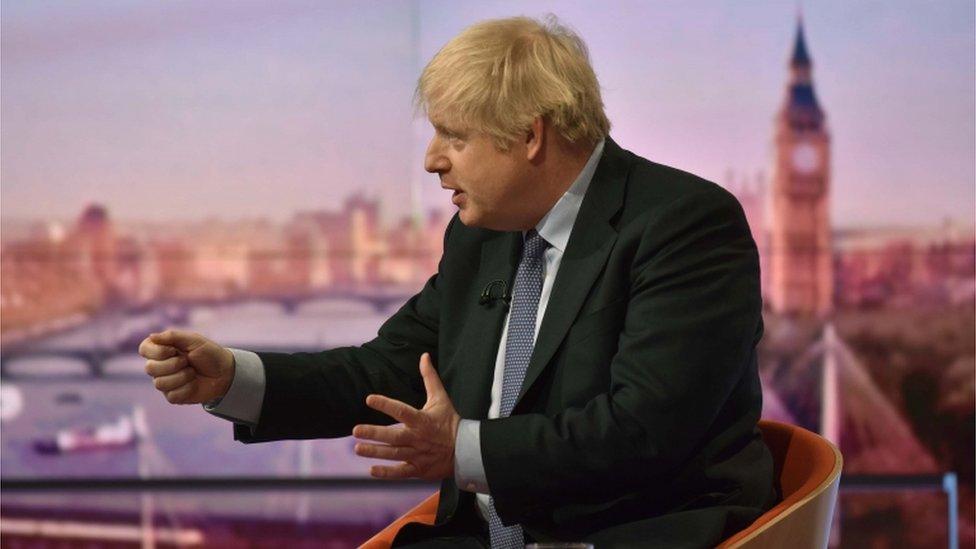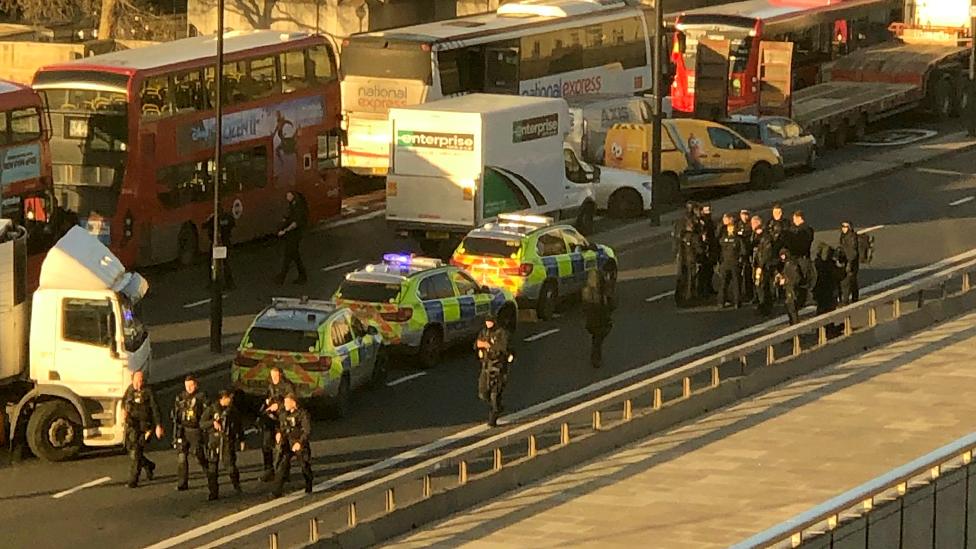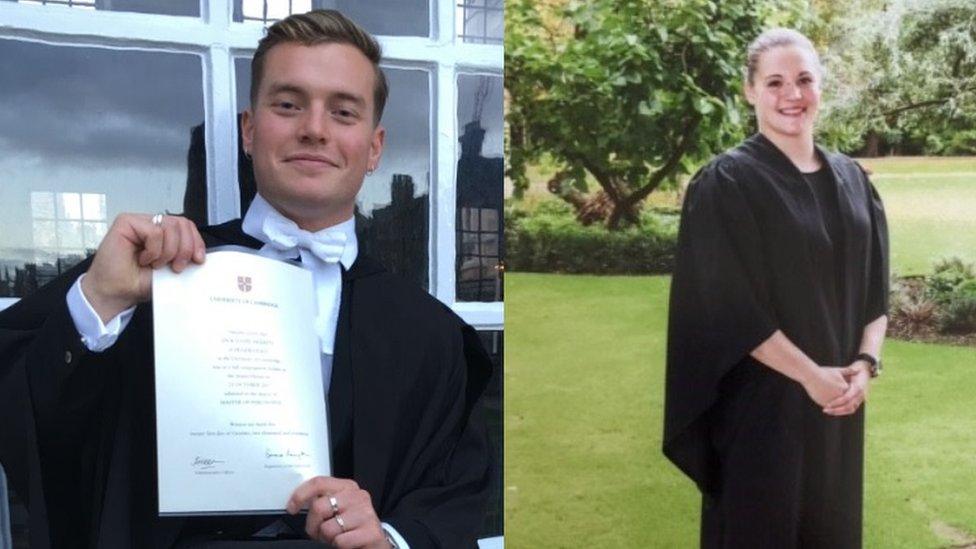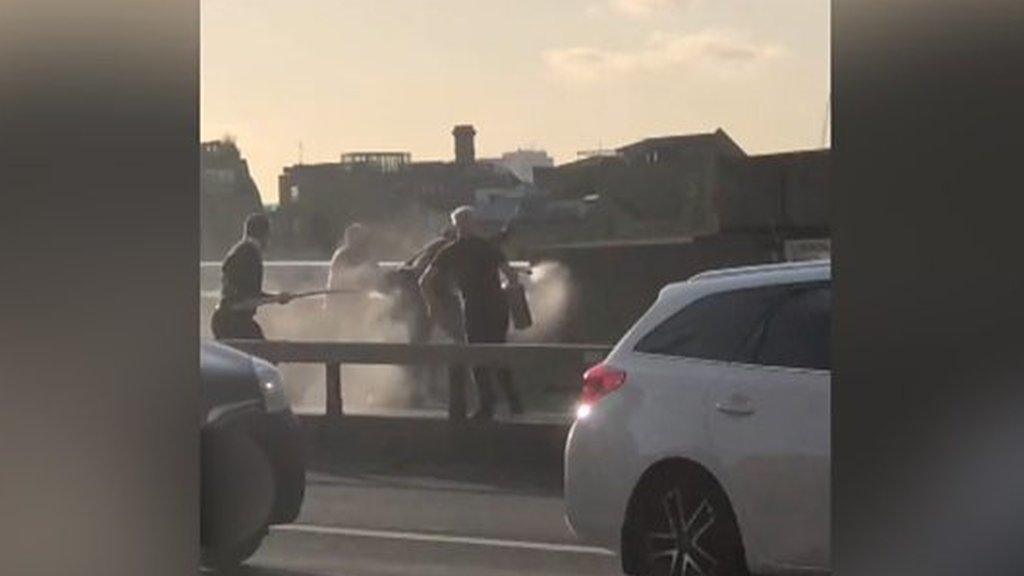Boris Johnson says 74 terror prisoners released early
- Published
Boris Johnson says about 74 convicted terrorists have been released early from prison
Boris Johnson has told the BBC that 74 people jailed for terror offences and released early will have their licence conditions reviewed.
The Ministry of Justice launched the urgent review after convicted terrorist Usman Khan, who had served half of his sentence, killed two people in a knife attack at London Bridge on Friday.
The prime minister claimed scrapping early release would have stopped him.
But Labour is blaming budget cuts for "missed chances to intervene".
Friday's attack was brought to an end when police shot Khan dead.
The 28-year-old had been jailed in 2012 over a plot to bomb the London Stock Exchange.
He was given a special jail term known as Imprisonment for Public Protection (IPP), which meant he would serve at least eight years and could not be released unless he had convinced the Parole Board he was no longer a threat.
But in 2013, the Court of Appeal replaced the sentence with a 16-year-fixed term of which Khan should serve half in prison.
He was released on licence in December 2018 - subject to an "extensive list of licence conditions", police said.
'Repulsive'
Mr Johnson told the BBC's Andrew Marr show it was "repulsive" that someone as "dangerous" as Khan could be released from prison after "only serving eight years".
He blamed Khan's release on legislation introduced under "a leftie government", insisting the automatic release scheme was introduced by Labour - but was challenged about what the Conservatives had done to change the law over the past 10 years in government.
"Now that I am prime minister I'm going to take steps to make sure that people are not released early when they commit... serious sexual, violent or terrorist offences," he said.
"I absolutely deplore the that fact that this man was out on the streets... and we are going to take action against it."
Mr Johnson said there were "probably about 74 people" convicted of serious offences who had been released early - a figure confirmed by the Ministry of Justice.
The prime minister said action had been taken immediately following London Bridge attack "to ensure there is no threat to the public".
In a separate development, a 34-year-old man was arrested on Sunday at his home address in Stoke-on-Trent on suspicion of the preparation of terrorist acts, the West Midlands Counter Terrorism Unit said.
There is no information to suggest that the arrested man was involved in the incident at London Bridge on Friday, the unit added.
But the arrest was made as part of "a wider on-going review of existing licence conditions of convicted terrorism offenders".
This video has been removed for rights reasons
One of the people Khan killed has been named by police as 25-year-old Jack Merritt.
The second victim has been named as Saskia Jones, a 23-year-old Cambridge University student. One of the three other people injured was a member of staff from the university.
NHS London has said two victims remain in a stable condition in hospital, while a third has been discharged.
They were all attending an event to mark five years of the Learning Together programme - which gives students and inmates the opportunity to study together to help reduce re-offending.
New sentencing
Foreign Secretary Dominic Raab earlier said the Conservative Party had a new policy to enforce a minimum sentence of 14 years for a person convicted of serious terrorist offences.
But Prof Ian Acheson - who advised the government on how to handle extremist prisoners in 2016 - told BBC Radio 4's The World This Weekend it was not "a question of an arms race on sentencing toughness", but about what is done when offenders are in custody.
He said 68 of the 69 recommendations he had made around the treatment and risk management of prisoners were agreed by the then Justice Secretary Michael Gove.
But he claimed they had not been implemented due to "the merry-go-round of political replacements of secretaries of state", and the "fairly recalcitrant and unwilling bureaucracy" it created.
Prof Acheson also criticised "crazy failed and ideological austerity cuts" to the police, prison and probation services.

How the law on early release changed

2003 - The Criminal Justice Act meant most offenders would be automatically released halfway through sentences, but the most "dangerous" would have their cases looked at by a Parole Board. Sentences with no fixed end point, called Imprisonment for Public Protection (IPP), were also introduced.
2008 - Criminal Justice and Immigration Act removed review process by Parole Boards, meaning more offenders were released automatically halfway through sentences. Judges could still hand down life sentences or IPPs for dangerous offenders.
2012 - Usman Khan was handed a sentence with no fixed end date because of the risk he posed to the public. In the same year, the Legal Aid, Sentencing and Punishment of Offenders Act scrapped IPPs and reintroduced the role of the Parole Board for extended sentences of 10 years or more - this time after two-thirds of the sentence has passed. But that did not mean those already serving IPPs would have them lifted.
2013 - During an appeal, Lord Justice Leveson ruled that Khan's indeterminate sentence should be substituted for an extended sentence with automatic release at the halfway point.

At an event in York, Jeremy Corbyn called for an inquiry into "everything surrounding" Khan, including his sentence and what happened to him in prison.
But he warned against "knee-jerk legislation", saying the country could "pay a price later".
Jeremy Corbyn says cuts in public services could put more lives at risk
In his speech, the Labour leader said: "No government can prevent every attack. No-one would believe any political leader who said they could.
"But the government can act to make such acts of terror less, rather than more likely."
Mr Corbyn said there needed to be more funding for public services, including probation and mental health.
"That can lead to missed chances to intervene in the lives of people who go on to commit inexcusable acts," he said.
"You can't keep people safe on the cheap."
Mr Corbyn told Sky's Sophy Ridge programme terrorists should "not necessarily" serve their full sentences automatically, but that it "depends on circumstances".
Usman Khan speaking to the BBC in 2008: "I ain't no terrorist"
Both parties have been accused of politicising the attack.
Liberal Democrat deputy leader Ed Davey told Sophy Ridge on Sunday that he was "alarmed" at Mr Johnson's reaction to the London Bridge attack.
"In the middle of an election, we shouldn't be making political capital out of a tragedy, and he's doing that, and he's doing that in a way which is misleading people about what the law actually says," he said.
But Brexit Party leader Nigel Farage tweeted that those convicted of terror offences "should never be released".
The father of Jack Merritt, who was a course co-ordinator for Learning Together, said in a now-deleted tweet that his son "would not wish his death to be used as the pretext for more draconian sentences or for detaining people unnecessarily".
Mr Raab said David Merritt should be listened to, declaring "nobody wants to see the politicisation of this".
But he added: "The question is, who is going to make sure that the overriding priority is avoiding any unnecessary risk to the public?"
"I think if you look at what we're saying on sentencing... it is the Conservatives who are saying we will stop at nothing to keep people safe."
- Published1 December 2019

- Published1 December 2019

- Published2 December 2019

- Published1 December 2019
